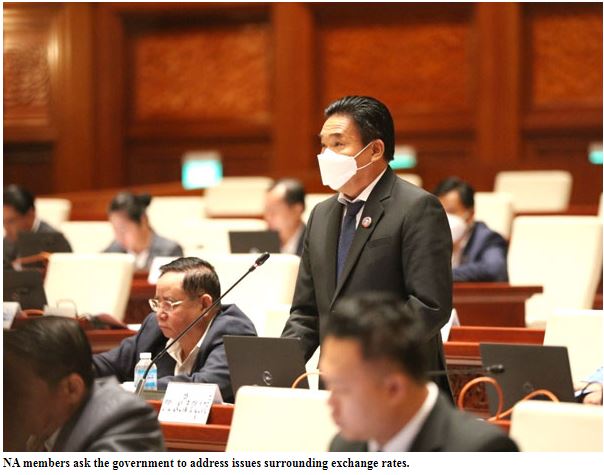Kip depreciation deals heavy blow to Lao economy
The Lao kip has plunged to a record low in recent days against the US dollar and Thai baht despite the government’s attempts to stabilise currency exchange rates.
The value of the national currency has nosedived since the end of March, the Governor of the Bank of the Lao PDR, Mr Sonexay Sitphaxay, told National Assembly members this week.
Over the past five months, the kip dropped in value by 7.79 percent against the US dollar and 8.43 percent against the Thai baht compared to the figures recorded at the end of last year, due to a supply-demand mismatch.
One of the greatest concerns is the increasing disparity between official exchange rates and the parallel market rate, which is ramping up pressure on importers and driving up inflation.
On June 10, the US$/kip parallel market rate exceeded the official rate by 25 percent and the Thai baht/kip exchange rate by 9 percent, according to the central bank Governor.
The Governor attributed the falling value of the kip to both internal and external factors. The appreciation of the US dollar in the international marketplace, the rising price of fuel and gold, and global uncertainty are jointly having a negative impact on the kip.
The Lao economy is vulnerable to external impacts, with limited foreign currency supply and high demand for imports and debt service repayments further contributing to depreciation pressures.
The kip has suffered the biggest loss in value against the baht and dollar since the Asian financial crisis of 1997-98.
BCEL exchange rates on June 14, 2017, saw US$1 buy 8,216 kip and sell for 8,256 kip, and one baht buy 242.93 kip and sell for 244.74 kip.
In contrast, on June 15 this year, US$1 bought 15,098 kip and sold for 15,132 kip, while one baht bought 507.53 kip and sold for 511.35 kip.
National Assembly members urged the government to do more to address financial problems, regulate exchange rates, and find solutions to the fuel shortage and spiralling inflation.
Members noted that in theory Laos should have enormous amounts of foreign currency at its disposal but that this is not all processed through the banking system. This requires the law to be strictly enforced to prevent any form of currency manipulation and loss of revenue.
Meanwhile, the central bank has pledged to regulate exchange rates, and especially reduce the gap between the official exchange rate and the parallel market rate.
The bank is committed to strengthening the management of foreign currency earned from exports and foreign investment.
The BOL will devise mechanisms to promote wider use of the kip and will continue to negotiate with trading partners over the buying and selling of goods in kip.
The bank will also review deposit/loan interest rates and enhance the quality of credit to ensure that loans boost commercial production for export purposes.
Source: https://www.vientianetimes.org.la/freeContent/FreeConten2022_Kip114.php


 English
English




